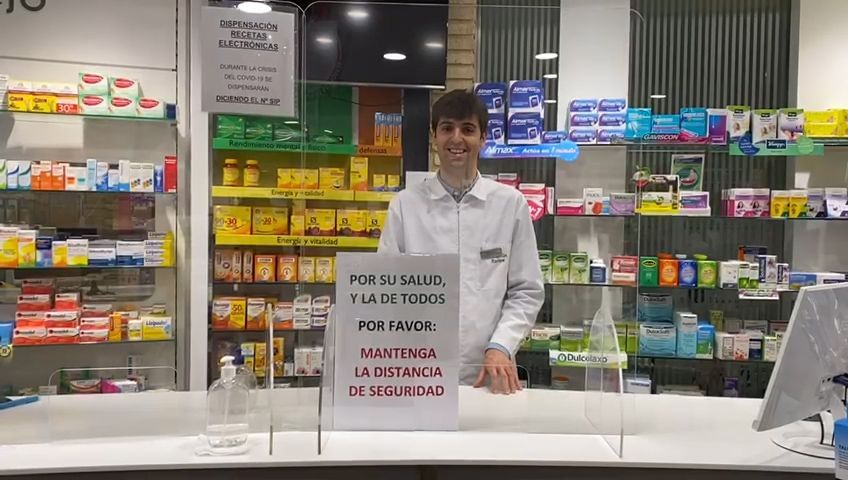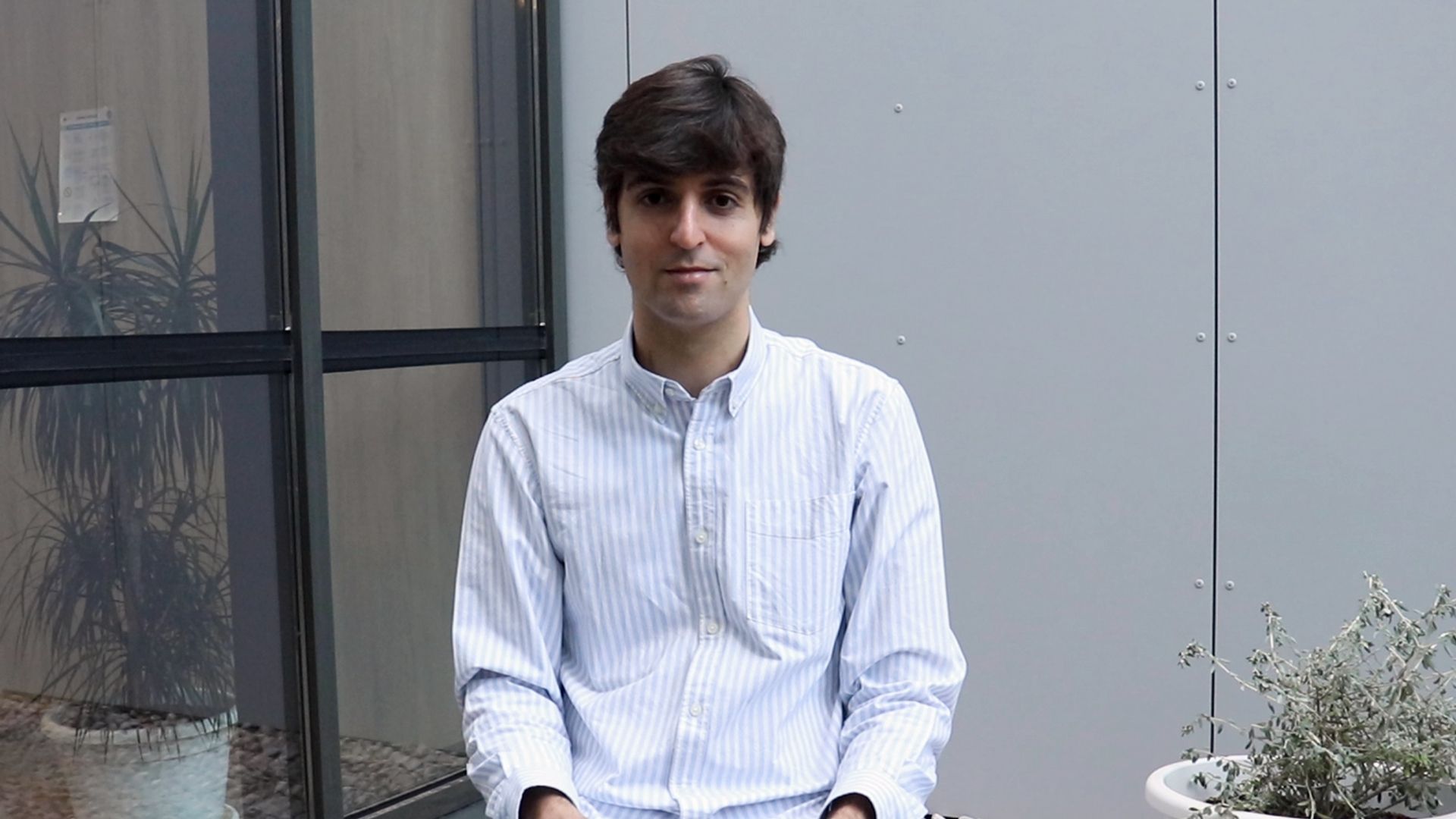Hernán Ramos is a pharmacist by vocation. After studying Pharmacy and Nutrition at the CEU Cardenal Herrera University, he’s now preparing a doctoral thesis on the early recognition of cognitive impairment. In this interview, he tells us what it has been like working in a pharmacy during the pandemic over the last year, highlighting the importance of the advice pharmacists can give and the wider role they play.
“I always wanted to study pharmacy and I don’t regret it”
 Interview with Hernán Ramos during the lockdown: Dispensing medicines out of hours.
Interview with Hernán Ramos during the lockdown: Dispensing medicines out of hours.
· The pandemic in Spain is now a year old and, throughout that year, community pharmacists have been on the front line. What has it been like?
· Very hard. We saw the risks early on. We started to see more people buying facemasks in the months before the pandemic was declared. We did think that it would come here and that it would be serious, but it still took us by surprise. It’s been a difficult year. At first, because of the uncertainty and the patients we see. And also because we have to provide information to patients and so we had to learn quickly about the virus, about treatments, about the different types of mask and how to use them correctly. We had to acquire and organize all that information quickly to be able offer patients the service they needed.
· A lot of information in very little time.
· When I’m in the pharmacy, I always try to ensure that patients are fully informed because that means they can take better decisions, adhere more closely to their treatment plan and understand their illness better. In the end, the better informed you are, the better the clinical outcome is likely to be. When you understand the illness and when you know how your treatment interacts with it, then you’re more likely to take steps to protect your health and to adhere more closely to the treatment plan. Information improves health.
“I think that all the information that a pharmacy provides is important”
· Has the pharmacist-patient relationship changed over the past year?
· I think we’ve all suffered from disinformation during the pandemic. Pharmacists had to provide information directly, clearly, and based on the evidence. I think that has been the key role that pharmacists have had to play during this crisis. We had to address all our patients’ questions and concerns, in the best way possible and based on what we know.
· As healthcare professionals on the front line, have you been vaccinated?
· Yes, this month. The pharmacists who were older than 55 have been vaccinated late, just a week ago. Too late, in my opinion.
· Hernán, why did you choose Pharmacy as your degree?
· It’s something that comes right from my childhood. My dad had a small pharmacy, in a village in the countryside, and so I saw him at work when I was little. And then there were two healthcare role models at home – my mum’s a psychologist and my dad’s a pharmacist – but I didn’t experience the psychological side as much as I did the pharmaceutical side.
“I always wanted to study pharmacy and I don’t regret it”
· You studied Pharmacy first and then Nutrition.
· When I did Pharmacy, I realized that it is perhaps the last stage in the service provided to the patient. The prevention side of the process comes first, in the form of the clinical care provided by the doctor, and then the pharmacological part comes later, treating the illness. And the truth is that I wanted to participate in the initial prevention stage too. Nutrition has that preventative element to it, in which you can work on the risk factors and prevent disease. You can work to ensure people live healthy lives. Nutrition isn’t just about eating the right food, but also about putting health strategies in place that can prevent the onset of disease.
· And that kind of preventive care, of trying to prevent disease by addressing risk factors, is exactly what Cátedra De Co, the CEU research chair on the early detection of cognitive impairment, provides in conjunction with community pharmacies. When did you become involved in this project?
· During my degree, my favourite course was Pharmacology. Lucrecia Moreno is just a great lecturer! I knew that, if I did a doctorate, I would do it on pharmacology with Lucrecia. Three years ago, I spoke to her and she told me about the cognitive impairment project. I learnt about the earlier project, called Ciudades Neuroprotegidas, and I met the team, and I liked it. It’s true that it’s difficult sometimes to juggle everything. Working in the pharmacy, dealing with the pandemic, and preparing a doctoral thesis – some days can be hard. But that’s always the case when you’re trying to bring a project to fruition.
What’s your thesis about?
· About the multidisciplinary work involved in the early detection of cognitive impairment. I’m so pleased to have taken the decision to do a doctorate, I really am. It gives you the chance to examine scientific knowledge in detail and develop your critical thinking.
“The end-of-degree project is very useful, but a doctorate gives you much more in-depth research training”
· Pharmacy, Nutrition and now a doctorate, all at CEU.
· Yes, I’m very satisfied with the education the University provides. I was young when I started my degree and I wasn’t very enthusiastic about studying. But the relationship I was able to establish with the lecturers and the education I received led to a gradual change in that attitude, and I started to become interested in knowledge. That’s the key. The University turned me onto learning. I’ve also had some great lecturers, such as Alicia López, Lucrecia Moreno, Pedro Alemán, Vicente Rodilla, Rafael Martín Algarra – people who change the way you think. Then there was Parasitology with Maruxi Dea – a fantastic lecturer! These are the lecturers we had and who helped us to improve and keep on improving.
“I’d study here again!”
· Thinking about the future, what would you like to do?
· My future is in the community pharmacy sector. If possible, I’d like to combine that with research. I’m not thinking about teaching. I really like research, but even more I like being in a community pharmacy, providing a service to patients and being able to give them the benefit of the knowledge we have.
Thank you very much, Hernán, and good luck in the future!







